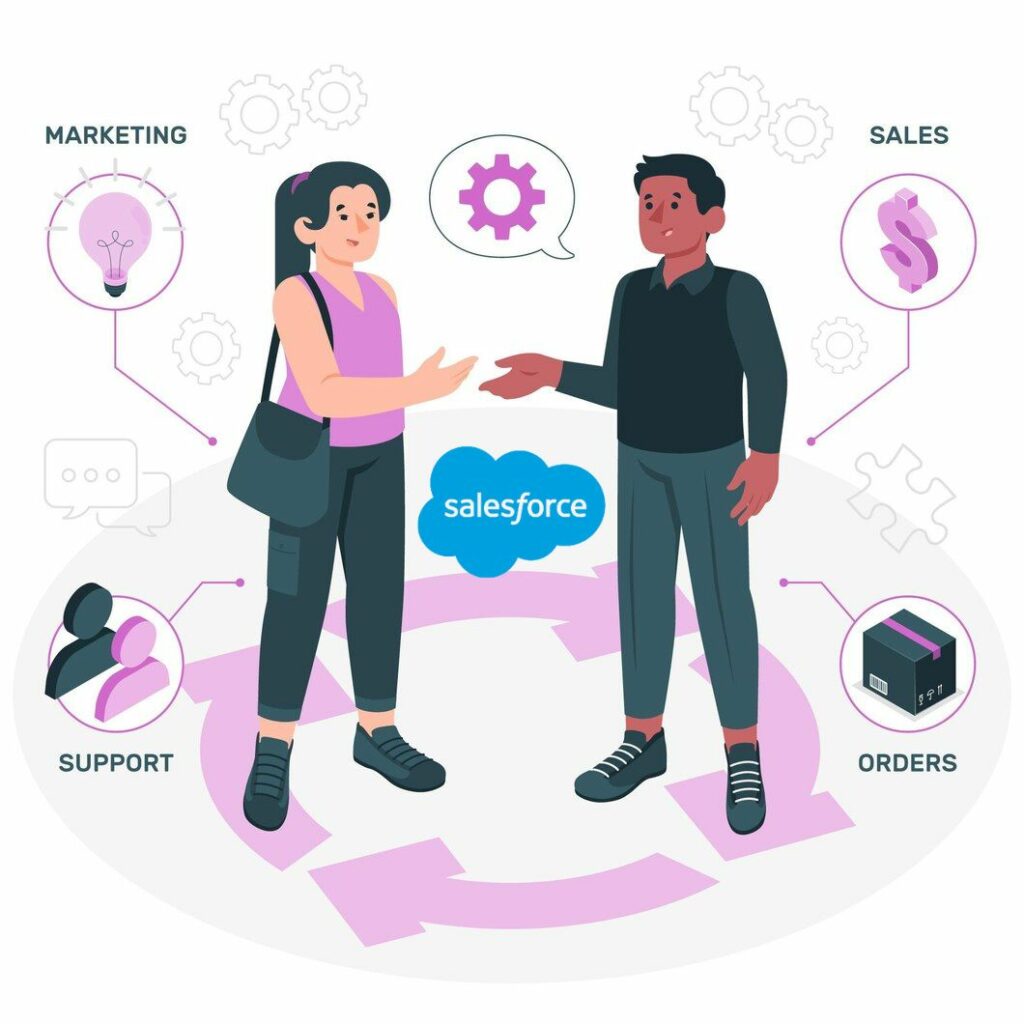Extend your system capabilities with NetSuite integration
Extend your system capabilities with NetSuite integration
Implementing the NetSuite solution and its customizable features helps you streamline your business processes and increase your business’s profitability, leading you toward growth.
To optimize the benefits of the NetSuite solution, equal attention is required toward the solution’s integration with the business. It must integrate well with the business’s existing applications, systems, processes, and services. Such integration with the NetSuite solution would enable the business to have a unified system to manage the processes and operations seamlessly.
Businesses look for unique solutions that can single-handedly meet all their business needs. Not all solutions have all the features and functionalities; some are standard, while others carry domain specialization. Even different business functions need to work together to contribute to business growth. It is where integration plays an important role – combining capabilities of different applications and systems to deliver the desired outcome.
Integration consolidates the power of your technology solutions, making it a single source for answers to all your business questions. Integration of the solution with other modules and applications helps you improve efficiencies.
Let’s get deeper into understanding the NetSuite integration.
NetSuite integration
NetSuite is a cloud ERP solution. Some business functionalities, like accounting, inventory management, CRM, etc., are ingrained in the solution. For more functionalities, you can integrate it with other applications.
Thus, NetSuite integration means connecting systems and databases to ease their interaction. You can interact with more functions besides the pre-built functionalities using NetSuite integration. The collaboration and coordination of different applications improve your business productivity by producing relevant insights on a timely basis. You can use the newly generated insights to make decisions for your business growth.
The information stays in your system if you do not integrate these applications or systems. Whenever you require such data, you will have to transfer it or import it in acceptable formats manually. Such manual transfer can lead to errors, missing information, or duplication of work.
Thus, NetSuite integration is vital to achieving the highest quality outcome and value for your technology investments.
Merits of NetSuite integration
NetSuite integration with other applications and systems leads to automated business processes and improved efficiencies. This automation results in fewer data errors and more accurate results.
Some of the critical merits of NetSuite integration are:
It automates your data-sharing process
When you connect the NetSuite solution and other necessary applications of your business, you create a single flow of work.
With this integration, you will not be required to transfer data from one application to another manually. The NetSuite solution and other systems share the IT resources and data, allowing you an uninterrupted flow of information.
It leads to more accurate results
We all know how automation of activities reduces the chances of manual errors. NetSuite integration makes automation possible, reducing the chances of duplication, missing data, or erroneous data. Thus, you have more correct data, resulting in higher accuracy in results.
It offers a strategic edge
You have the NetSuite solution with several features and capabilities. But based on your industry needs, you can extend its capabilities as much as you want. You can connect your legacy systems with the NetSuite solution to deliver more productive processes.
With NetSuite integration, you can create strategic solutions for your goals with holistic visibility of the business numbers and processes. You can develop add-on functionalities to handle the unique process of your business. You can improve your process performance with this integration from your innovative integrated solution.
It improves coordination and collaboration
When you integrate two applications, you enable collaboration between those two functions. Your functional teams understand data better. They know what is happening in other departments and how that information is helpful to them.
Also, they can resolve doubts or ask for updates from other teams, allowing an opportunity to collaborate better on activities and tasks. It improves communication between teams and enhances teamwork.
For example, the procurement team places an order while the customer handling team handles customers. Coordination between them ensures a fine balance between demand and supply. For this balance, the procurement and customer-facing teams must interact and collaborate seamlessly.
It saves costs
Integration of other systems with the NetSuite solution helps create a single system of processes and information. Such integration allows you to handle only one integrated solution instead of managing several applications. It results in lower management and maintenance costs.
Also, the integrated solution improves your business operations, optimizing the business processes and reducing operational costs.
It helps in decision-making
Integrated systems provide a single view of information from start to finish, at a click, without surfing through different systems. This complete picture of business operations let you know the points of efficiency and where you are lacking, drawing your immediate attention to improving the same.
You get a real-time view of all your business data in one place. With a single, real-time view, you can make precise decisions faster. Thus, NetSuite integration can help you build an edge over your competitors.

Different methods of NetSuite integration
You can achieve these benefits only if the NetSuite integration is a success. Different methods, as mentioned below, enable the integration of NetSuite with other systems and databases.
Custom code
If you are looking for the most flexible option of NetSuite integration, go for custom code. In this case, developers create NetSuite integration from the start. You may rely on the in-house technical developers for the customized coding or outsource the development work to third-party expert developers.
You can create custom APIs, reports, and Web Services between NetSuite and other systems. The most significant merit of this method is its customization to your specific business needs. You also save your subscription costs, but you need to spend on regular software maintenance.
But it might be a riskier option because developers need to code every little detail for the integration. One error in the integration application might harm the final system. The developers must also be adept at routine updates and ongoing maintenance.
Connectors
Connectors are software tools that integrate NetSuite with other applications or systems. Connectors allow you to map data sets between NetSuite and other applications. NetSuite provides such connectors for online marketplaces, eCommerce storefronts, third-party logistics providers, and POS systems.
These connectors enable data transfer between two applications. Thus, you reduce the chances of manual errors, save time, and cut employees’ efforts. You can have a centralized database with all the information. This single data source has all the information about all the business processes, offering you complete visibility of all your activities and hence, more control.
Natural integration
When you combine the native modules within the platform, a natural integration happens. The best part of natural integration is that the central database keeps all the data centralized. You no longer need to depend on third-party integrations.
Integration platform
One of the most preferred methods of NetSuite integration is an integration platform. You can use the integration Platform as a Service (iPaaS) to connect NetSuite with other applications. Middleware and Centre for Internet Security (CIS) are other platform options for NetSuite integration.
With integration platforms, you can share data between NetSuite and other applications. These platforms can be on-premises, cloud, or hybrid. Some of the integration platforms include Zapier, Celigo, Jitterbit, etc.
API integration
API integration enables comprehensive integration between NetSuite and other systems. It allows the user to use all features and functionalities of NetSuite from the other application. The two types of NetSuite APIs are:
a. SuiteTalk
It is a web service integration tool. You can use it to integrate NetSuite with some legacy systems and applications. But it cannot integrate with all legacy systems. So, you need to be more careful when using SuiteTalk for integration.
Extreme customization is not possible with SuiteTalk. But the integration using SuiteTalk is faster and requires fewer resources. A developer with knowledge of Microsoft.NET or Java can manage integration using SuiteTalk. It supports NetSuite’s primary solutions – ERP, eCommerce, and CRM applications.
b. SuiteScript
You can use SuiteScript to build applications in NetSuite. You can host other applications on the NetSuite solution. Based on different types of events, you can select any of the following NetSuite Script types:
- Map/Reduce
- Bundle installation
- RESTlet
- SuiteLet
- Client script
- Mass update
- User event
- Schedule
- PortLet
- Workflow action
After choosing the script type, you need to create a source code. You can access the suite script library and set of tools to bring more efficiency to your process. Thus, you can create more customizations with NetSuite integration based on your business requirements.
A NetSuite SOAP-based API is compatible with most programming languages. It is based on the Web Services Description Language (WSDL) standard.
Another option is the NetSuite REST (Representation State Transfer) API, based on JavaScript Object Notation (JSON) standards. Using it, you can integrate the NetSuite database and databases of other applications. Being based on JSON makes it compatible with most server and cloud-based software, increasing its ease of use.
Cloudiotech as the partner for NetSuite integration
Cloudiotech is a NetSuite Implementation partner in the US and the UAE. We have years of experience providing NetSuite integration services to clients in different industries. Our NetSuite experts ensure the expansion of your solution’s capabilities by seamlessly integrating it with a wide range of applications. It drives more efficiencies, productivity, and flexibility to explore new business opportunities.
We have the capabilities and experience to help you at every step of adopting the NetSuite solution. You do not have to worry about the implementation complications – we handle it all. We manage the customizations as per your business needs and industry demands.
Our technical team can handle the simplest and most complex integration needs. We ensure that you have all your legacy systems and other applications working in tandem with the NetSuite solution. Our fast, efficient, and smooth integration services help you improve your customer experiences.
Want to move ahead with your selected NetSuite solution?
Talk to one of our experts for the necessary integration.




